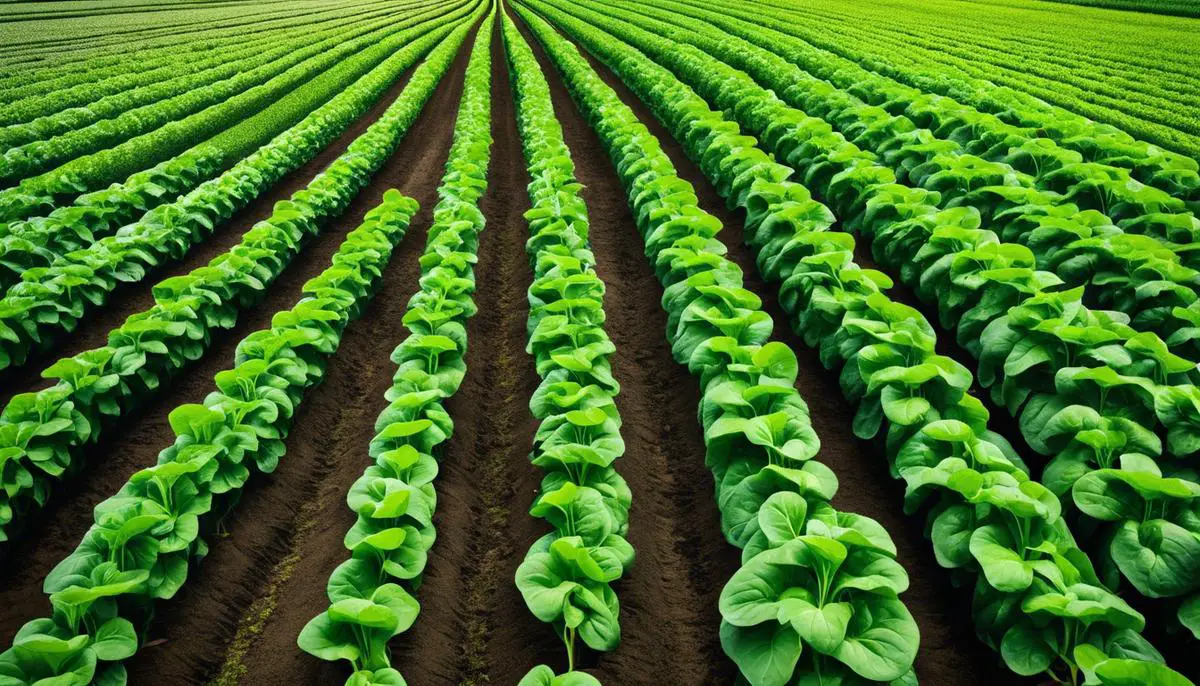Organic farming practices, particularly in the cultivation of crops like spinach, have emerged as an eye-catching hallmark of sustainability in agriculture. This essay endeavors to shed light on the journey and significance of organic spinach cultivation, from its humble origins to its current acclaimed value in maintaining environmental equilibrium and human health. Illustrated here are the critical principles of organic farming that are often underpinned by practices such as nurturing soil health and embracing natural pest control. As we embark on this exploration, we will also comprehend the prerequisites needed for effective organic spinach cultivation and learn about the potential challenges and solutions inherent in this practice.
History and Importance of Organic Spinach Cultivation
Organic farming, inventively sculpting the agriculture industry, has introduced the concept of nurturing crops naturally, sans synthetic inputs.
One such beneficiary of this method is spinach, famed for its nutritional wealth.
Reader Poll: What online courses would interest you?
Organic spinach farming consolidates an intriguing tale of agricultural evolution interlaced with a global call for health enrichment.
Rewinding to the 1940s, our story takes root from England with the “organic farming” moniker coined by Walter James, 4th Baron Northbourne in his book “Look to the Land”.
Lord Northbourne, vehemently believing in treating the farm as a biological organism, propelled the concept of organic farming, which over time has ripened to what we perceive today.
Subscribe to our newsletter!
Spinach cultivation was not alien to agricultural practices even before the dawn of organic farming.
This hearty leafy green known to flourish in temperate climates has been a part of our food platter since history began weaving its tales.
However, the inception of organic farming pedaled its journey towards a healthier realm.
Fast forward to today, organic spinach cultivation has charted a meteoric rise.
Its importance intertwines across several aspects.
Foremost, it promises a haven of nutrients laded with vitamins A, C, and K1, iron, calcium, and folic acid, without the dubious coat of chemical pesticides or synthetic fertilizers.
More importantly, organic spinach farming respects the interdependency of the biosphere, becoming a poster child for sustainable farming practices.
Scientific research shows synthetic fertilizers leach into groundwater causing widespread aquatic ecosystems disturbance.
Unlike conventional farming, organic technique abstains from synthetic fertilizers, hence diminishing the water pollution quotient drastically.
The use of sustainable pest management techniques further adds to its ecological prudence.
Above all, organic spinach cultivation supports soil health.
High on humus content, organic farming nourishes the soil microbes, thus improving soil’s water-holding capacity.
Over time, the soil morphs into a cornucopia of nutrients, enhancing produce quality, and mitigating soil erosion.
Emphasizing soil welfare, organic spinach farming waves the banner of sustainability high.
Its prudent pest management and creditable conservation of natural resources echo chorus to the United Nations Sustainable Development Goals.
Furthermore, it fuels a healthier food chain beginning from the soil, through our platter, to our bodies.
No argument can overlook the contribution of organic spinach farming against the global climate crisis.
Healthy soils act as carbon sinks, intensifying carbon sequestration.
To put it simply, organic spinach farming indirectly aids in staving off global warming.
Proponents of organic farming extrapolate these perspectives, pressing on the vital role of organic spinach farming in the grand tapestry of agriculture.
Unboxing a realm veined with enhanced health benefits and ecological balance, organic spinach cultivation hails as an illustrious chapter in the annals of agriculture.
In a world grappling with climate crisis and health confusions, organic spinach stands as a beacon of sustainable eating and farming.
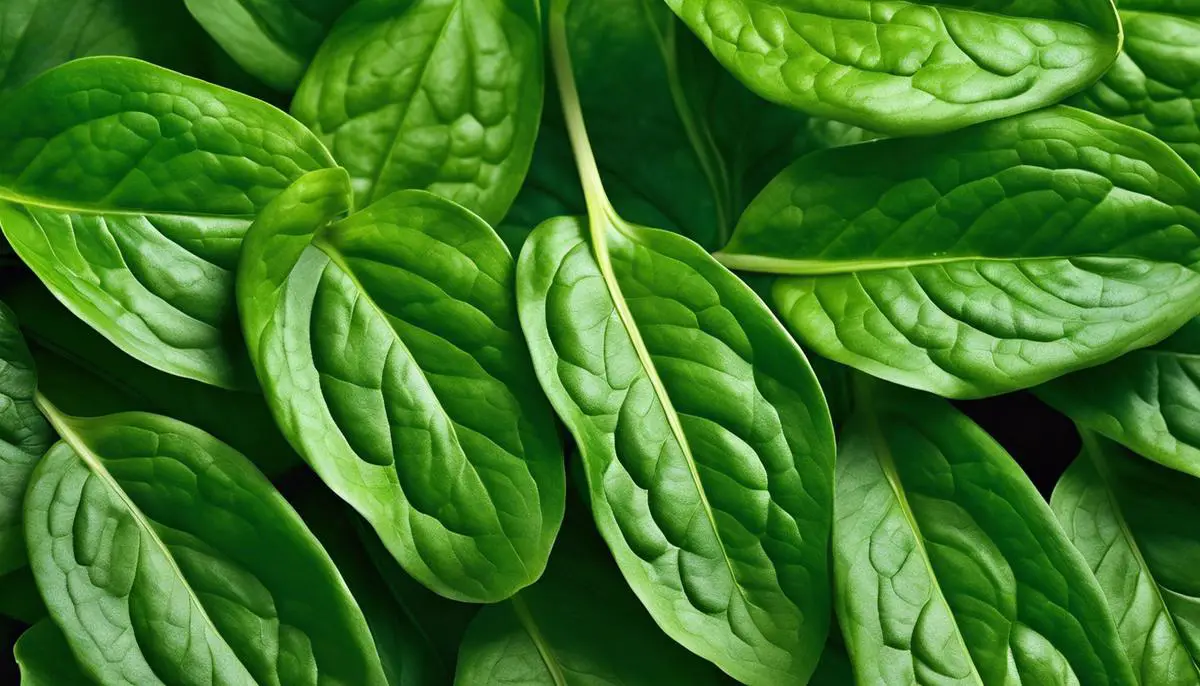
Principles of Organic Cultivation
Delving deeper into the principles of organic cultivation, one starts to appreciate the transformative nature of the practice. Notably, organic farming leans heavily towards nurturing the soil naturally and promoting biodiversity, while avoiding the use of synthetic fertilizers and pesticides. Organic farming methods extend their advantage to three profound areas; the cultivation process itself, environmental wellness, and the end-consumers health. Portraying the principles through the lens of organic spinach farming could become an exciting expedition.
Like all organic farming, the cornerstone of organic spinach cultivation is maintaining soil health naturally. Spinach requires fertile, loose, and well-drained soil. Organic cultivation promotes soil enrichment through the use of compost, green manure, and organic amendments, thereby ensuring optimal health for the crop. Furthermore, the use of crop rotation, a key organic farming practice, prevents soil degradation and build-up of pests. Organic spinach farmers often interplant spinach with crops like radish and strawberry to disrupt pest cycles and promote a balanced ecosystem.
Another key principle of organic farming is the minimal use of synthetic inputs. Rather than deploying artificial pesticides, organic spinach farming invites natural predators such as beetles, birds, spiders, and even fungi to act as biocontrol agents. Additionally, companion planting and the use of botanical and biopesticides act as formidable shields against pests and diseases.
Biodiversity preservation represents the third salient principle. Organic farming encourages crop variability to maintain an equilibrium within the ecosystem. When it comes to spinach, intercropping and crop rotation strategies contribute to biodiversity. By planting spinach with diverse set of crops such as beans and onions not only improves the soil nutrients, but also forms a natural pest-repellent environment.
The organic cultivation model roots for closing the ecological loop. In essence, waste management aims to retain nutrients within the farming system rather than discarding them. This principle holds immense significance in organic spinach farming. Farm waste, primarily in the form of crop residue, is decomposed in a controlled manner. The resultant compost is reintroduced into the soil, facilitating a nourishing cycle of growth and replenishment.
Organic spinach farmers also focus on energy conservation. The avoidance of synthetic inputs eliminates the energy-intensive process of their production and application. Moreover, the cultivation methods such as manual weeding, mulching, and the use of cover crops reduce energy input and costs while maintaining high-quality spinach yields.
While the principles of organic cultivation may seem overwhelming, an interesting fact is the adaptability of these principles. Applying these principles on spinach farming not merely supports healthy spinach yield but also contributes to a broad picture of environmental health and sustainability. It benefits farmers, consumers, and our ecosystem, setting a considerable example of sustainable agriculture at its best.

Prerequisites for Organic Spinach Cultivation
When considering the intricate dynamics of growing spinach organically, several prerequisites and parameters weave an indispensable tapestry of success. Undeniably, the linchpin to cultivating this nutritious green is a thorough understanding of soil health. Indeed, the vitality of spinach is predicated on the rich, fertile soil it calls home.
Composting is a critical part of nurturing soil health in organic spinach farming. The decomposition of organic matter not only enriches the soil but also provides essential nutrients to plants. More so, the introduction of green manure and organic amendments, such as bone meal or rock phosphate, into the soil profile enhances the availability of macronutrients, thereby providing an essential foundation for robust spinach growth.
Crop rotation also plays a pivotal role. It’s not just about avoiding soil degradation, but also mitigating pest build-up, which can perpetuate losses in spinach yield. The practice of rotating crops creates an unstable environment for pests and disease vectors, discouraging them from establishing a permanent foothold in the field.
An alternative to synthetic pesticides in organic farming is the concept of biocontrol, an ingenious method rooted in nature’s inherent checks and balances. Encouraging natural predators—ladybugs, spiders, or birds, for instance—helps maintain a healthy equilibrium. Besides, the use of biocontrol agents, such as beneficial bacteria and fungi, offers a biologically harmonious means of fending off detrimental pests.
Furthermore, the ancient algorithm of companion planting and the use of botanical and biopesticides offers additional protection against pest invasions and disease outbreaks. Each ‘companion’ protects the spinach plants by repelling certain pests, attracting beneficial insects, or offering physical characteristics that give the spinach a competitive leg up.
Intercropping and crop rotation also support biodiversity, another fundamental element in organic farming. By cultivating a variety of crops together or in rotation, farms become more like ecosystems—home to a broad spectrum of species diversified enough to keep any one population from outcompeting others.
Moreover, organic farming embraces the ecological loop, a keyword being recycling. The waste generated from the farm, be it plant residues or animal manure, are composted and reintroduced into the field, thereby maintaining the nutrient cycle and minimizing off-farm inputs.
Lastly, but by no means least, organic farming imparts significant energy conservation. Rather than relying on energy-consuming synthetic inputs, organic farming primarily leans on manually intensive methods. While laborious, this approach reduces the overall carbon footprint of the farming operation, aligning with sustainable ideals.
In essence, the principles of organic cultivation symbolize a harmonious adaption that recognizes and respects the interconnectedness of all life, with a keen focus on environmental health and sustainability. Therefore, growing organic spinach is not merely an act of farming, but essentially a profound affirmation of life’s enduring persistence in harmony with nature.
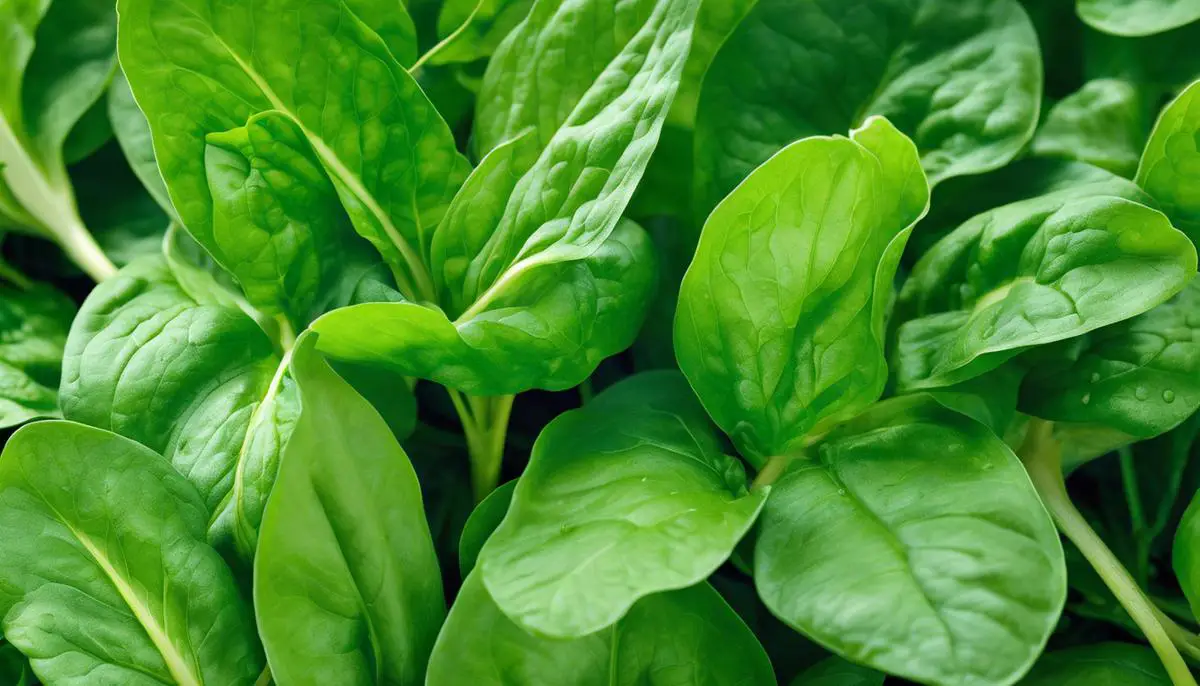
Challenges and Solutions in Organic Spinach Cultivation
Venturing into the challenges faced by organic spinach farming lays the groundwork for understanding the resilience, thoughtfulness, and adaptability needed in managing these obstacles. An appreciation of the challenges within the frame of an integrated farm management system is critical.
Foremost among the concerns is soil fertility management. Organic spinach, being a heavy feeder, depletes the soil nutrient stock rapidly, necessitating strategic and consistent soil management. Synthetic fertilizers are off the table in organic farming. Instead, home-grown solutions like animal manures, compost, cover crops, and organic amendments like alfalfa meal, rock phosphate, and greensand are advised to maintain nutrient balance. These additions influence soil physical attributes by adding organic matter, while also improving its biological vitality from the microorganisms inherent in composts and manures.
Additionally, a significant challenge is pest and disease infestation. Synthetic pest control measures are not an option here. Thus, fostering a diversity of life as a countermeasure is key. For example, employing the use of predatory insects and birds for pest control. Building habitats like hedgerows, ponds, and flowering strips can attract these natural pest control agents. Moreover, introducing biocontrol agents like parasitic wasps, ladybugs, and biological pesticides derived from plant extracts and microorganisms can alleviate pesticide concerns.
Another hurdle lies in weed management. In the case of organic spinach, hand-weeding and cultivating between rows is often necessary. Mulches made from organic residues, straw, and black plastic can also be beneficial. They can suppress weeds, retain moisture, and even contribute to soil organic matter increase.
Efficient water management is another challenge that can significantly determine the success of organic spinach farming. Spinach requires consistent water for optimal growth, but excessive moisture can contribute to leaf diseases. Therefore, tailored irrigation systems like drip irrigation that deliver water directly to the root zones of spinach plants can help conserve water and combat diseases. Monitoring the moisture levels regularly also plays a vital role in mitigating water-related issues.
While these challenges may seem daunting, with the right knowledge and techniques, addressing these can result in both productively and environmentally sustainable farming systems. Techniques like crop rotation, companion planting, intercropping, and consistent monitoring of pests, diseases, and soil health, can pave the way for a highly operational organic spinach farm. As dedicated researchers and advocates of organic agriculture, continued exploration and advancement of these strategies will build a resilient, and much needed, organic farming industry. Dedication to this pursuit will not only ensure nutrient-rich organic spinach for the consumer but also, admirable strides towards environmental sustainability. Just as the roots of the spinach plant delve deep into the soil, so too, we must delve tirelessly into our studies and strategies, catalyzing a healthier, more sustainable future that begins right under our feet.
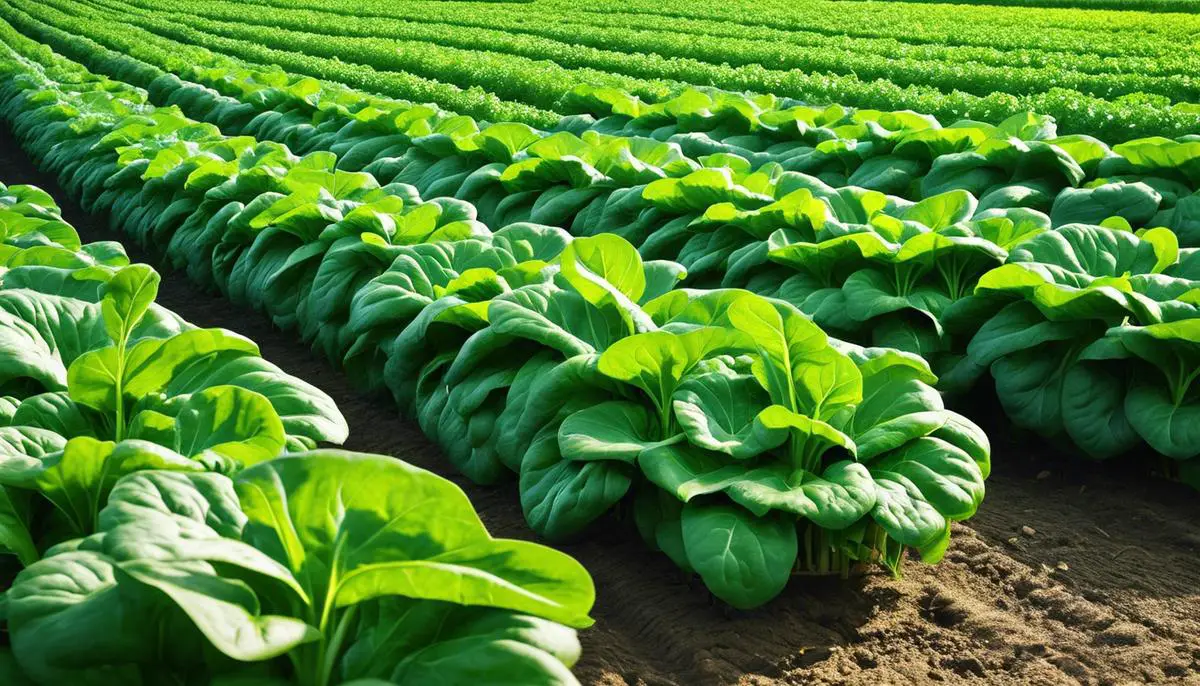
Impact of Organic Spinach Cultivation on Environment and Health
Organic spinach cultivation necessitates rigorous soil fertility management. Common practices include the application of organic soil amendments, such as animal manures, compost, and cover crops. These inputs, along with organic amendments such as alfalfa meal, rock phosphate, and greensand, are used instead of synthetic fertilizers. Quite interestingly, these amendments influence not only the soil’s physical attributes but also its biological vitality. Herein lies the crux of organic spinach farming: the creation of a vibrant, living soil that provides necessary nutrients to produce healthful crops.
Pest and disease infestation is an inevitable facet of farming. However, organic spinach farming takes a unique approach to this challenge. Instead of using synthetic pesticides, organic farmers employ a multitude of natural pest control measures. Here, fostering a diversity of life forms an essential bulwark against pest invasion. The deployment of predatory insects and birds, together with the introduction of biocontrol agents and biological pesticides, significantly mitigates pest incidence. This multifaceted approach impeccably exemplifies the intricacies and considerations of organic farming and its delicate interaction with ecology.
Weed management in organic spinach farming presents another unique perspective. Instead of employing synthetic herbicides, practices such as hand-weeding, cultivation between rows, and use of mulches made from organic residues, straw, or black plastic are common. Concurrently, these strategies represent the essential wisdom of organic farming: changing the modus operandi from ‘combating’ to ‘managing’—a paradigm shift fully in line with the holistic intent of organic cultivation.
As water is the lifeblood of any agriculture, efficient water management is crucial in organic spinach farming. This involves the use of tailored irrigation systems and regular monitoring of moisture levels at different soil depths. Through such practices, organic spinach farming ensures the optimal use of water, a finite resource. It further emphasizes the ethos of environmental stewardship inherent in organic farming.
In conclusion, the broader impacts of organic spinach farming are mirrored in its techniques for productive and environmentally sustainable farming. These techniques, including crop rotation, companion planting, intercropping, and meticulous, science-driven monitoring of pests, diseases, and soil health underline a refreshing narrative. A narrative that showcases how organic spinach farming transcends mere cultivation, becoming instead a vanguard in the fight for a sustainable and health-conscious future. Organic spinach farming becomes a microcosm of responsible, sustainable food systems—an ode to our monumental potential to reshape our relationship with nature.
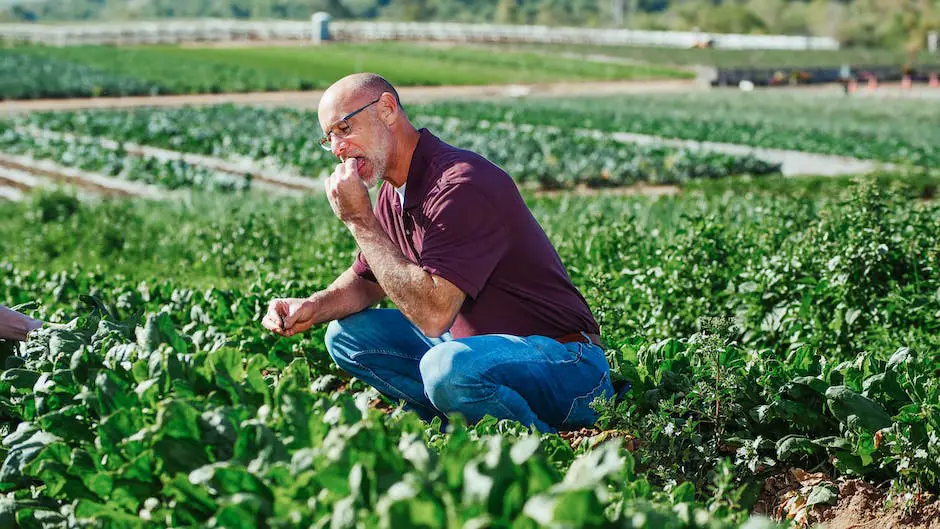
As we’ve journeyed through the multifaceted dimensions of organic spinach cultivation, it becomes clear how integral it is not only to the health of our bodies but in preserving the health of our planet. Through its contribution to biodiversity, the improvement of soil health, the reduction of our carbon footprint, and the mitigation of risks linked to pesticide exposure, we indeed reap more than what we sow. Furthermore, there’s undeniable scientific evidence linking the consumption of organically grown spinach to an array of improved health benefits. As such, organic spinach cultivation represents a meaningful synergy between humanity and nature, offering a promising pathway to a sustainable and healthier future.

